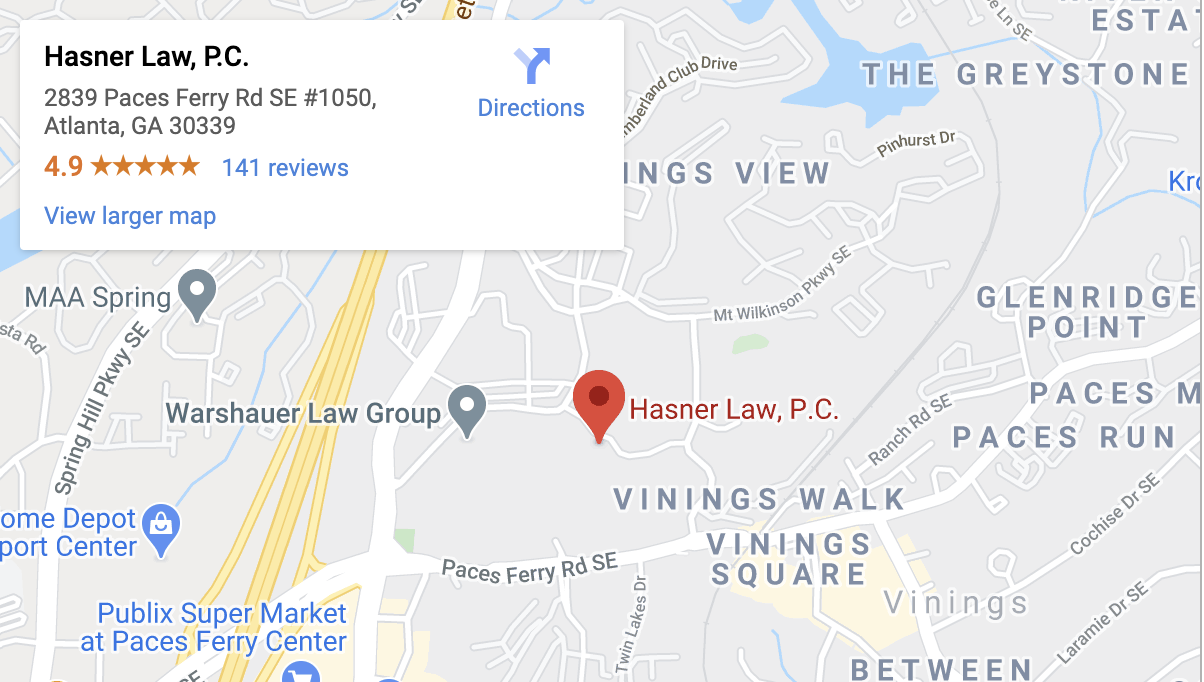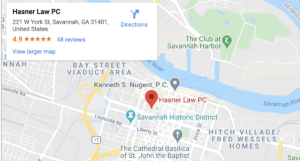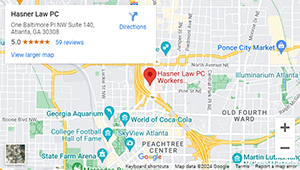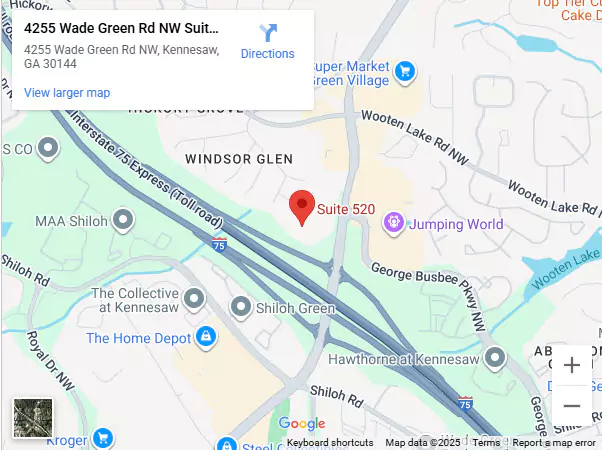Workers’ Compensation Benefits in Atlanta

Being hurt at work can cause more than just physical discomfort. If the injury is severe, you may be unable to return to your job and you could have outstanding medical bills to pay. This can lead to tremendous stress and you may be wondering how you are going to cover your basic living expenses.
Fortunately, the Georgia workers’ compensation law was created to help you with these issues. Workers’ comp is a form of insurance carried by your employer that covers health care costs and provides injured workers with payments for lost income.
When you get hurt, few things will be more important than your pursuit of workers’ compensation benefits. You don’t have to navigate the process on your own. The experienced Atlanta workers’ compensation attorneys at Hasner Law Injury & Workers’ Compensation Attorneys are here to help and answer your questions.
We have more than 70 combined years of experience helping injured workers in Georgia recover the money they need after devastating on-the-job accidents. If you’ve been hurt, we’re here to help you, too. All you have to do is give us a call at (678) 888-4878 and set up a free consultation today.
Georgia Workers’ Compensation Injury Assessment

Now, the nature of your workplace injury will determine what benefits you are entitled to receive under workers’ comp. Injuries are classified as either permanent or temporary. Further, some injuries are so severe that they are considered catastrophic.
The following injuries are what Georgia law deems catastrophic:
- Severe brain injuries
- Spinal injuries that result in paralysis
- Injuries resulting in the amputation of an arm, hand, leg, or foot
- Total blindness
- Second-degree burns covering more than 25% of the body
- Third-degree burns covering more than 5% of the body
- Any other injury that prevents the employee from working the job he or she held before the injury (or from performing similar work that is currently available)
Proving that an employee cannot find similar work to that performed before the injury is difficult. It requires looking into an employee’s past experience and education and then checking the current job market to see if comparable work exists.
A factor that is also relevant is whether the employee qualifies for Social Security Disability benefits. This is because the social security eligibility requires a finding that you are unable to work due to a disabling medical condition.
Medical Benefits
Workers’ comp pays for medical treatment if you are injured on the job. Medical treatment includes:
- Doctor bills
- Corrective surgery
- Physical therapy
- Prescription costs
- Travel expenses, and
- Nearly all other treatments ordered by a physician.
The program pays for chiropractic care, but not acupuncture or massage therapy.
It is important to note that you must visit a doctor that has been pre-authorized by your employer. The healthcare professional will then charge the insurance provider directly and you will not be billed. However, in cases of emergency, you may go directly to the emergency room. You will receive reimbursement for any ER expenses that are billed to you.
Reimbursement is also available for travel expenses involved in obtaining medical care at $.40/mile. However, keep in mind that all reimbursement requests must be submitted within one year of treatment.
Medical Rehabilitation

Rehabilitation costs associated with a workplace injury are also covered by workers’ comp. This includes services such as physical therapy, so long as they are necessary for treatment and ordered by a doctor authorized by your employer. Note that you must follow all of your doctor’s instructions in order for the costs to be covered.
Vocational Rehabilitation
Some workers suffer such significant injuries that they are no longer able to do the work they were doing before the accident. Vocational rehabilitation is a benefit offered in these situations and is typically limited to workers with catastrophic injuries. The intent is to prepare the employee for the type of work he or she is able to perform with the injury.
The benefit provides educational programs, career counseling, skills tests, and job placement services. Note that you cannot enroll in these services on your own and then apply for reimbursement. You must go through the workers’ comp process and receive guidance through an authorized provider.
Bear in mind that vocational rehabilitation is required for workers with catastrophic injuries. This means that your attendance at these programs is mandatory.
Now, if your injury is non-catastrophic, your employer may still choose to offer vocational rehabilitation. However, an employer is never required to provide this service. Further, your use of these benefits is voluntary.
Income Benefits
You may also be entitled to lost income if you are unable to return to work for a period of time. These benefits will depend on whether your disability is considered partial or total. A partial disability means that you can continue to work at a diminished capacity, often for less pay. By contrast, a total disability means that you are unable to work at all.
The amount you are entitled to receive in income benefits is generally two-thirds of your earnings before the injury up to the maximum set by law.
Total Disability

If you have a total disability from an injury that occurred after July of 2019, your maximum weekly benefit is $675. The minimum amount you can receive is $50 per week, and you will be entitled to this amount even if two-thirds of your pre-accident wages were less. Note that there is a 21-day waiting period for income benefits, starting on the date you were injured.
You can receive these benefits for a maximum of 400 weeks or until you reach what is known as “maximum medical improvement.” Maximum medical improvement means that you have healed as much as possible and no further treatment would elevate your condition.
Once maximum medical improvement is reached you will be evaluated to see if you have a permanent disability. If you are found to have a permanent disability, you may continue to receive benefits for the rest of your life.
Temporary Partial Disability
You have a temporary partial disability if you can still perform some work, but in a diminished capacity. This might mean performing light duties or working fewer hours than before the accident.
The amount you can receive in income benefits is two-thirds of the difference in your average weekly wage before and after the injury. For example, assume you made $1000 per week before the injury. If you are only able to earn $500 per week while you are recovering, the difference would be $500. You would then be eligible to receive two-thirds of this amount, or $330 per week.
Note that the maximum weekly benefit for temporary partial disability benefits is $450 for injuries occurring after July of 2019. You can receive these payments for up to 350 weeks or until you reach maximum medical improvement.
Permanent Partial Disability
For partial disabilities that are permanent, you are entitled to a maximum weekly benefit of $675 for injuries occurring after July of 2019. However, bear in mind that the number of weeks you can collect payments depends on the type of injury.
State law provides a list of the typical injuries and how many weeks you can collect for each type. For example, the loss of an arm entitles you to 225 weeks. Losing an eye results in 105 weeks, and 60 weeks applies to losing a thumb.
If your injury is not on the list, your payments will be based on a disability rating. This rating is determined by your physician and looks at the body as a whole. Your rating will determine how many weeks of benefits you may receive up to a maximum of 300 weeks. For example, if you are found to be 50% disabled, you would be entitled to receive benefits for 150 weeks.
Death Benefits for Dependents

If a work-related injury results in death, your dependents will receive workers’ comp benefits. Dependents typically include your spouse and/or any minor children you may have. Note that these individuals must actually be dependents of yours to qualify. For example, if your children are supported entirely by your ex-spouse, they would not be entitled to benefits. The same is true if your spouse fully supports himself or herself.
For qualified dependents, the amount they are entitled to receive is two-thirds of your weekly income, up to a maximum of $675. For minor children, payments will continue until the child reaches adulthood. This age is typically 18, but extended to 22 if the child enrolls in school. Note that if the child is physically/mentally incapable of taking care of himself or herself, payments will continue beyond these ages.
For spouses, payments will continue until the spouse either remarries, turns 65, or receives 400 weeks in payments, whichever occurs first. Note that with all dependents, payments will cease after benefits reach the total maximum payout of $270,000.
For qualified dependents where support is shared, the amount they are entitled to receive in death benefits is determined by the proportion of support you provided while living. For example, if you and your spouse supported your children equally, the children would be entitled to 50% of the total workers’ comp benefit amounts.
Your dependents are also entitled to funeral expenses. As of 2019, these amounts are capped at $7,500.
Contact Hasner Law Injury & Workers’ Compensation Attorneys to Speak With a Qualified Workers’ Compensation Lawyer in Atlanta
If you are denied benefits that you are entitled to, contact a qualified Atlanta workers’ compensation lawyer at Hasner Law Injury & Workers’ Compensation Attorneys. We offer a free, no-obligation case evaluation. Remember, you have a limited time to file and appeal workers’ compensation claims. Contact our Atlanta law firm today for immediate assistance.






